Unit 8 Natural disasters 复习课件40张
文档属性
| 名称 | Unit 8 Natural disasters 复习课件40张 | 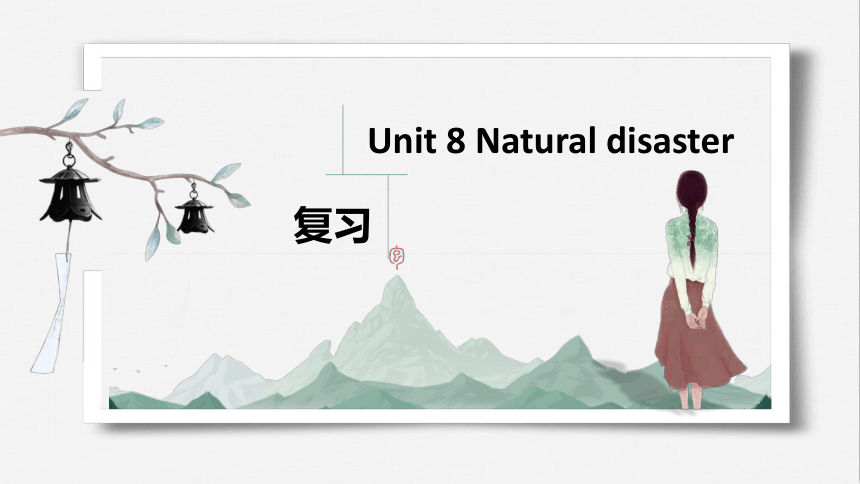 | |
| 格式 | pptx | ||
| 文件大小 | 3.6MB | ||
| 资源类型 | 教案 | ||
| 版本资源 | 牛津译林版 | ||
| 科目 | 英语 | ||
| 更新时间 | 2022-01-01 13:42:29 | ||
图片预览

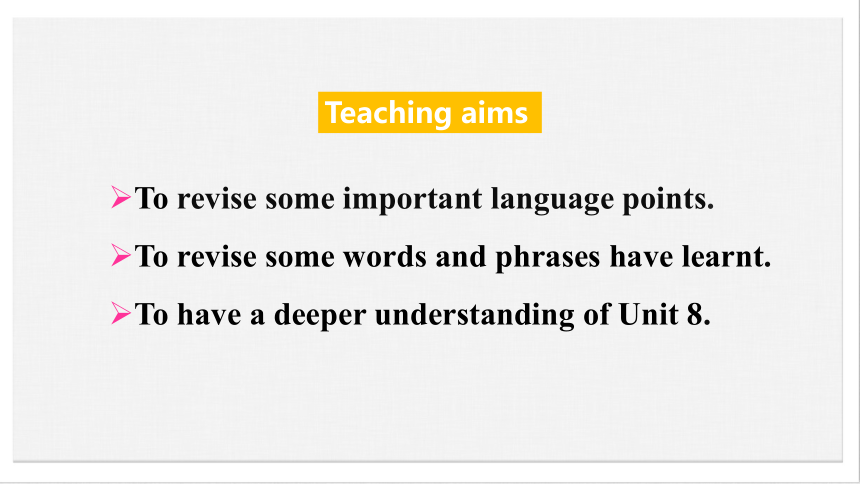
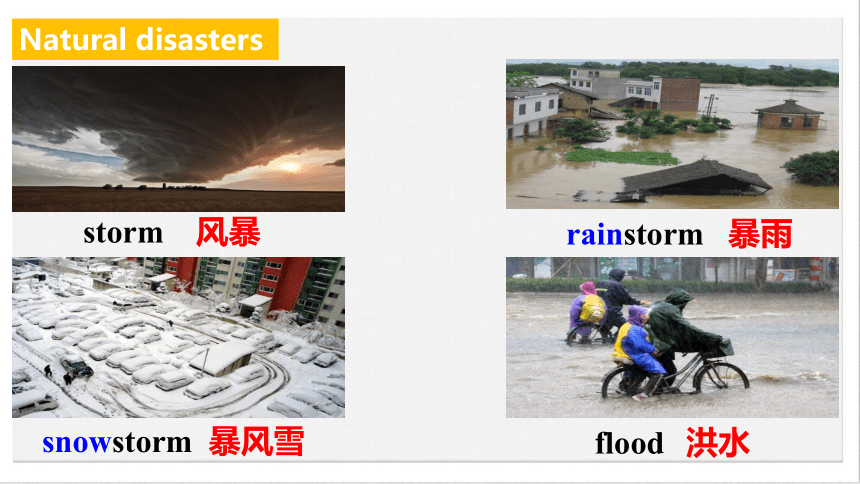
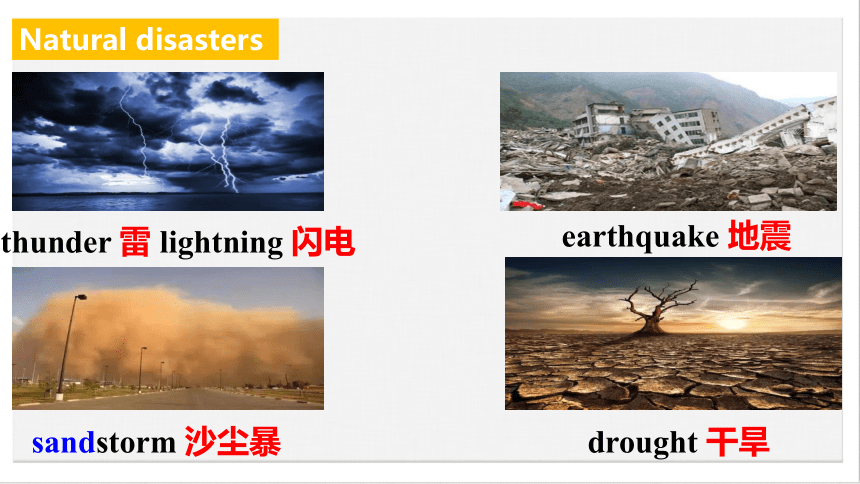
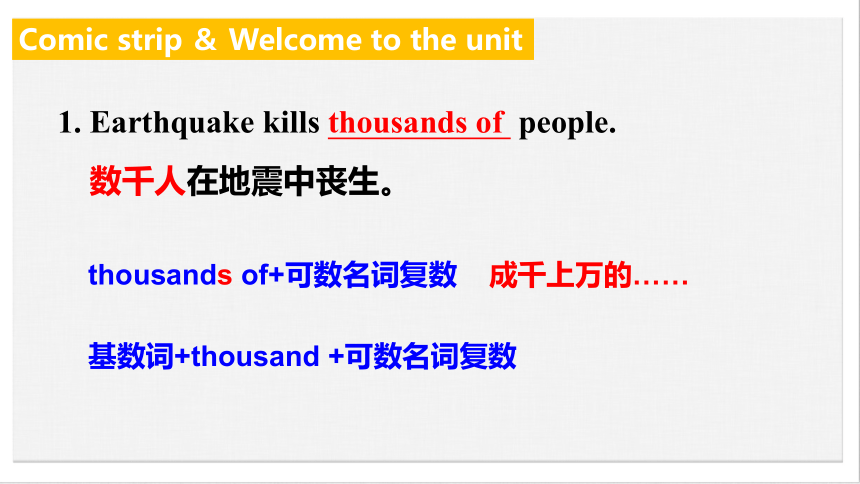
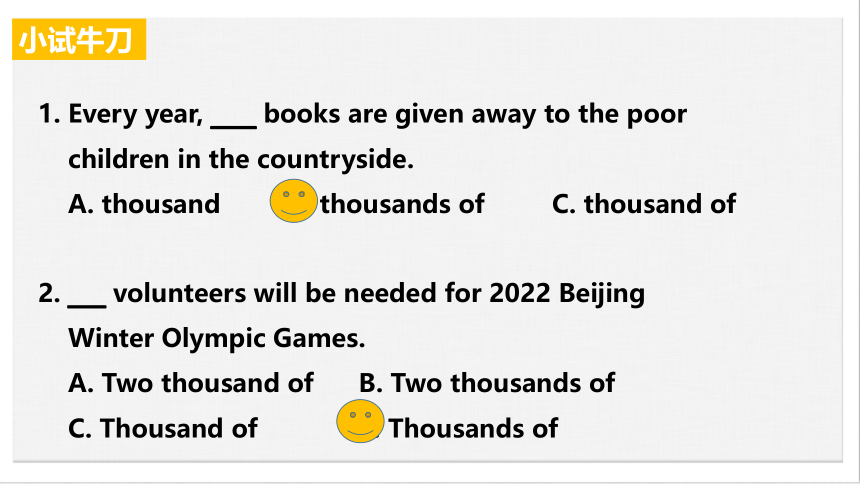
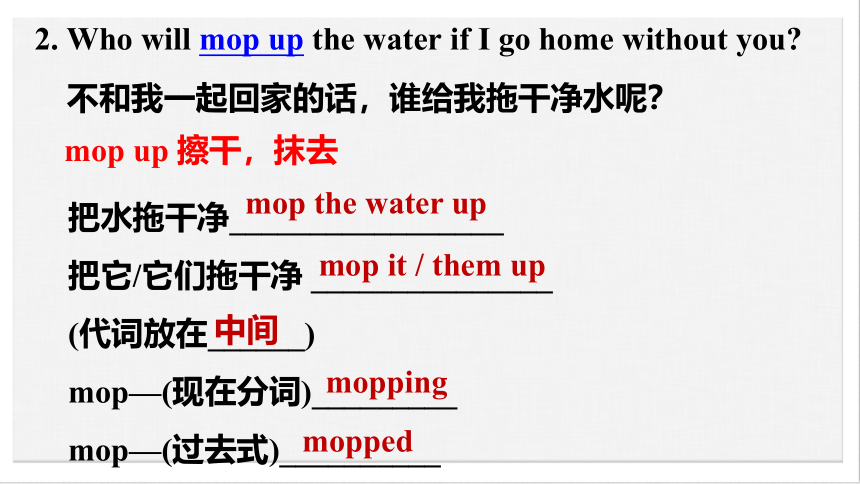
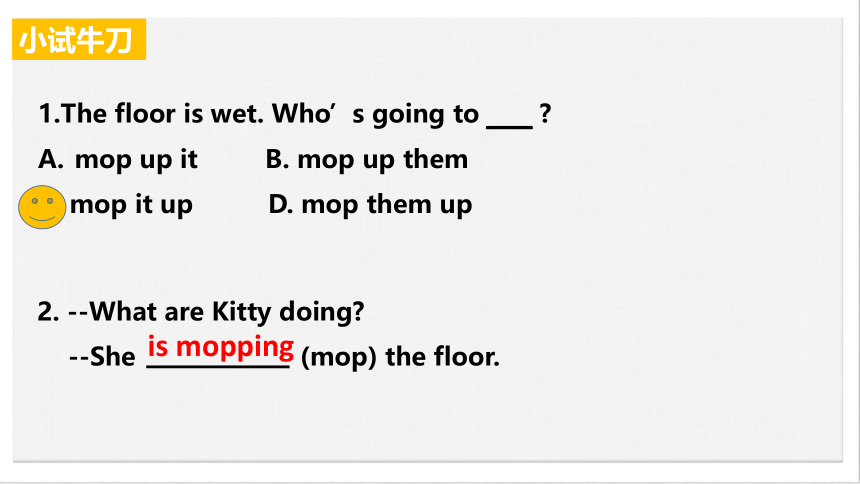
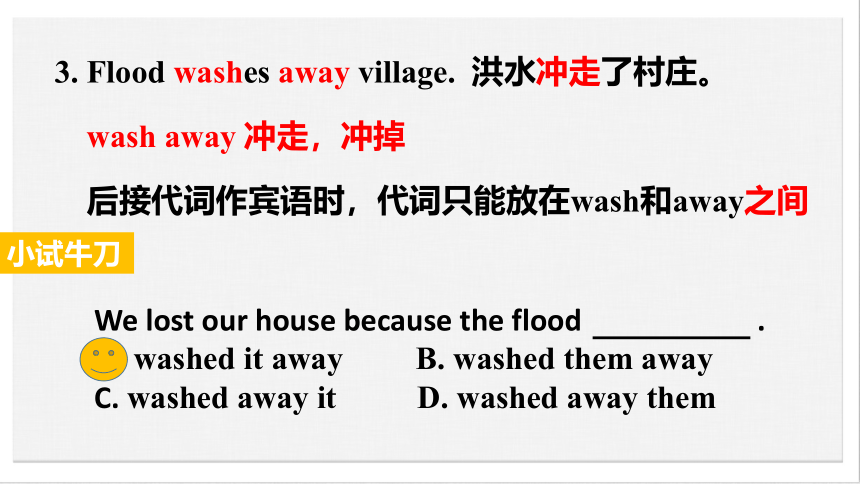
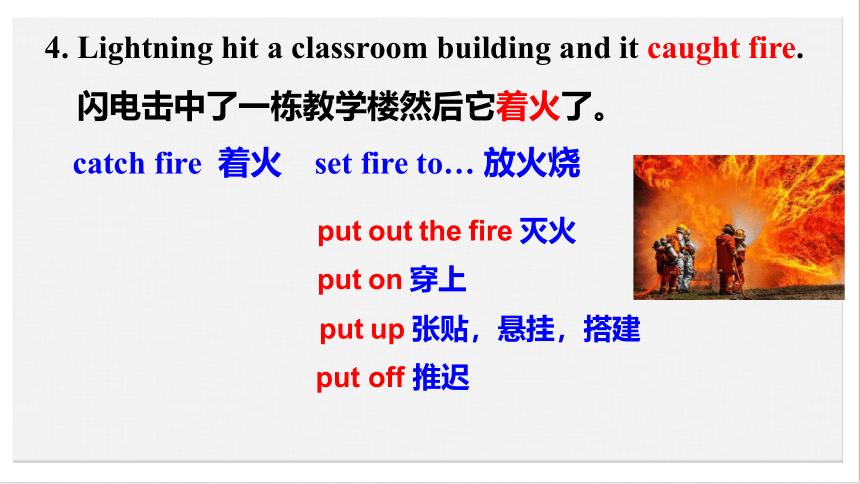
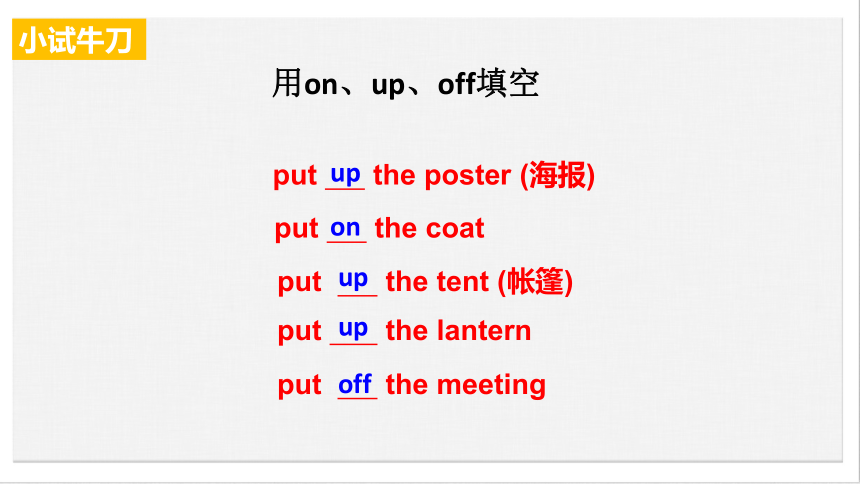
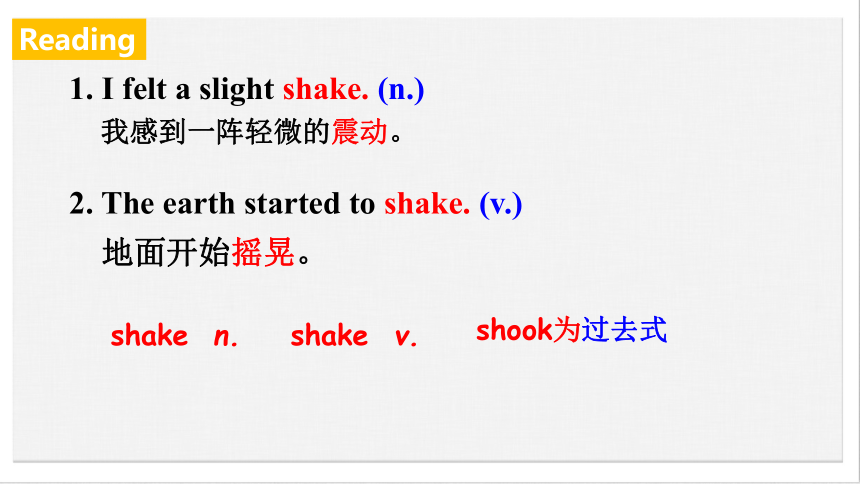
文档简介
(共40张PPT)
Unit 8 Natural disaster
复习
Teaching aims
To revise some important language points.
To revise some words and phrases have learnt.
To have a deeper understanding of Unit 8.
Natural disasters
storm 风暴
snowstorm 暴风雪
rainstorm 暴雨
flood 洪水
thunder 雷 lightning 闪电
Natural disasters
earthquake 地震
sandstorm 沙尘暴
drought 干旱
1. Earthquake kills thousands of people.
数千人在地震中丧生。
thousands of+可数名词复数 成千上万的……
基数词+thousand +可数名词复数
Comic strip & Welcome to the unit
1. Every year, books are given away to the poor
children in the countryside.
A. thousand B. thousands of C. thousand of
小试牛刀
2. volunteers will be needed for 2022 Beijing
Winter Olympic Games.
A. Two thousand of B. Two thousands of
C. Thousand of D. Thousands of
把水拖干净_________________
把它/它们拖干净 _______________
(代词放在______)
mop—(现在分词)_________
mop—(过去式)__________
mop the water up
mop it / them up
中间
mopping
mopped
2. Who will mop up the water if I go home without you
不和我一起回家的话,谁给我拖干净水呢?
mop up 擦干,抹去
1.The floor is wet. Who’s going to
mop up it B. mop up them
C. mop it up D. mop them up
小试牛刀
2. --What are Kitty doing
--She (mop) the floor.
is mopping
3. Flood washes away village. 洪水冲走了村庄。
wash away 冲走,冲掉
后接代词作宾语时,代词只能放在wash和away之间
小试牛刀
We lost our house because the flood .
A. washed it away B. washed them away
C. washed away it D. washed away them
put out the fire 灭火
put on 穿上
put up 张贴,悬挂,搭建
put off 推迟
4. Lightning hit a classroom building and it caught fire.
闪电击中了一栋教学楼然后它着火了。
catch fire 着火 set fire to… 放火烧
小试牛刀
put the poster (海报)
put the coat
put the tent (帐篷)
put the lantern
put the meeting
up
on
up
up
off
用on、up、off填空
Reading
1. I felt a slight shake. (n.)
我感到一阵轻微的震动。
2. The earth started to shake. (v.)
地面开始摇晃。
shake n. shake v.
shook为过去式
小试牛刀
1) At first, the slight _______ of the house
made Timmy frightened.
2) When the earthquake really started,
the earth _______.
shook
shake
用shake的正确形式填空。
2. People screamed in fear.(n.)
人们恐惧地尖叫。
in fear 害怕地,恐惧地
相似的结构还有:
in trouble 有麻烦的
in need 需要帮助的
in danger 处于危险之中
3. Some ran out of the building.
一些人跑出了大楼。
run out of … 从……跑出
Some people run out of the market.
e.g.:一些人从商场里跑出来。
4. I tried my best to run out too, but I could not.
我也尽我最大的努力往外跑,但我没能 (跑出去)。
try one’s best (not) to do sth.
= do one’s best (not) to do sth.
尽某人最大的努力做某事
try 的三单tries
Try 的过去式tried
小试牛刀
Many children are left alone in the countryside.
Let’s try our best .
A. help B. helping C. to help D. helps
5. Then the walls began to come down too!
然后墙也开始坍塌!
come down,崩塌,坍塌
6. “I’m trapped,” I said to myself.
我对自己说:“我被困住了”。
say to oneself 自言自语,心里说
be trapped 被困住的
小试牛刀
I silently : “ I can do it”!
A. say to yourself B. say to himself
C. say to herself D. say to myself
7. A moment of fear went through my mind, but I
told myself to calm down …
我的脑海中掠过一阵恐惧,但我告诉自己要冷静下来。
calm down 冷静下来,平静下来
calm v. 使平静,使镇静
n. 平静,宁静
adj. 平静的,镇静的
8. … I was trying to find my way out, …
find one’s way out 找到出路
e.g. 他想要找到出路。
He wants to find his way out.
9. They quickly moved away the bricks.
move away 搬走,移走
e.g. 请把那个桌子和那把椅子搬开。
Please move away the desk and the chair.
10. I started to pull myself slowly through the dark.
我开始在黑暗中慢慢的向前移动。
移动,抽出,常指(较费力地移动)
Grammar
Past continuous tense
表示在过去某一时刻正在进行的动作。常与at ten last night (昨晚十点), then (那时),
at this time yesterday (昨天这个时候),
at that time/moment (在那时), when I came in
(当我进来时)等连用.
过去进行时
表示过去某段时间一直在进行的动作。
常与the whole morning (整个早上),
from7 to 10 this morning (从早上7点到10点)
连用.
过去进行时
Past continuous tense
肯定句 主语+was/were+动词ing+其他.
否定句 主语+was/were not+动词ing+其他.
一般疑问句 Was/Were+主语+动词ing+其他
肯定回答:Yes, 主语+was/were.
否定回答: No,主语+was/were not.
1. break
vi. 损坏,打破
过去式
broke
break down
(车辆或机器)出故障,坏掉
2. because of
由于,因为
短语
sb./sth.
doing sth.
because
+
句子
小试牛刀
I did not buy this pair of shoes (因为)
it was too expensive.
because
2. He was late (因为) the rain.
because of
long action VS short action
延续性动词 VS 短暂性动词
延续性动词指动作可以持续一段时间,而不是瞬间结束。如read, work, study, have, drink, eat,sleep, wear等。
短暂性动词指动作极为短暂,瞬间结束。如start, arrive, jump, hit, wake (醒来), die (死亡), borrow, come, go, fall, leave, break (打破)等
“主长从长”型:即主句和从句为两个同时进行的
动作或存在的状态,此时通常要
用while,含有“一边......一边......”
之意。
I was listening to music while I was driving from 7 a.m. to 5 p.m. yesterday.
昨天早上七点到下午5点,我一边听音乐,一边开车。
“主短从长”型:即主句是一个短暂性动作,而从句是一
个持续性动作,此时三者都可用。
Jim hurt his arms when/while/as he was playing tennis.
吉姆打网球时把手臂扭了。
When/While/As she was waiting for the train, she
became very impatient.
她在等火车时,变得很不耐烦。
“主长从短”型:即主句是一个持续性动作,而从句
是一个短暂性动作,此时可以用as
或when,但不能用while。
It was raining hard when/as we arrived.
我们到达时正下着大雨。
When/As he came in, I was listening to the radio.
他进来时,我在听收音机。
Integrated skills&study skills
119-Fire
122-Traffic
120-Hospital
110-Police
What should we do first What accident How to deal with it
_____________ First,
After that,
Finally,
Burn of hands
[b n]
keep the hand in cold water for about ten minutes.
go and see the doctor.
cover the burn with a clean towel.
复合词(compound words)
★“名词+ 名词”或“形容词+ 名词”可以合成名词。例如:
class + room →
black + board →
★“名词+ 形容词”或“形容词+ v-ing 形式”可以合成形容词。例如:
world + famous →
easy + going →
classroom
blackboard
world-famous
easy-going adj. 悠闲地
★“副词+ 动词”或“形容词+ 动词”可以合成动词。例如:
over + sleep →
white + wash →
oversleep v. 睡过头
whitewash v. 粉刷
Introduction
Para 1
Structure(结构)
Para 2-3
the snowstorm
Para 4
the snowstorm
Part 1
Part 2
Part 3
During
After
Task
During …
1. What were you ding when…
2. What was the disaster like
3. What did you do/hear/see
4. How to protect yourselves
After …
1. What did you do/hear/see
2. I felt…
Introduction(介绍)
What When Where
Choose a topic(话题)
How to write
I lost my umbrella in the wind and I nearly fell over.
我把伞丢在了风里,并且差点摔倒。
fall over (往前) 摔倒
fall down 摔倒 (不侧重往哪个方向倒)
fall behind 落后,落伍
起初
惊恐地
在地下
向四处跑
玻璃的碎片和砖块
开始倒塌
冷静下来
in fear
run in all directions
pieces of glass
and bricks
begin to come down
calm down
Translate the following phrases
at first
under the ground
8. 根本看不见
9. 处于困境中
10. 一阵恐惧
11. 找到出去的路
12. 听到人们兴奋
的欢呼声
13. 移走,拿开
14. 最后
can not see at all
be trapped
a moment of fear
move away
find one's way out
hear shouts from
excited people
at last
Thanks for listening!
Unit 8 Natural disaster
复习
Teaching aims
To revise some important language points.
To revise some words and phrases have learnt.
To have a deeper understanding of Unit 8.
Natural disasters
storm 风暴
snowstorm 暴风雪
rainstorm 暴雨
flood 洪水
thunder 雷 lightning 闪电
Natural disasters
earthquake 地震
sandstorm 沙尘暴
drought 干旱
1. Earthquake kills thousands of people.
数千人在地震中丧生。
thousands of+可数名词复数 成千上万的……
基数词+thousand +可数名词复数
Comic strip & Welcome to the unit
1. Every year, books are given away to the poor
children in the countryside.
A. thousand B. thousands of C. thousand of
小试牛刀
2. volunteers will be needed for 2022 Beijing
Winter Olympic Games.
A. Two thousand of B. Two thousands of
C. Thousand of D. Thousands of
把水拖干净_________________
把它/它们拖干净 _______________
(代词放在______)
mop—(现在分词)_________
mop—(过去式)__________
mop the water up
mop it / them up
中间
mopping
mopped
2. Who will mop up the water if I go home without you
不和我一起回家的话,谁给我拖干净水呢?
mop up 擦干,抹去
1.The floor is wet. Who’s going to
mop up it B. mop up them
C. mop it up D. mop them up
小试牛刀
2. --What are Kitty doing
--She (mop) the floor.
is mopping
3. Flood washes away village. 洪水冲走了村庄。
wash away 冲走,冲掉
后接代词作宾语时,代词只能放在wash和away之间
小试牛刀
We lost our house because the flood .
A. washed it away B. washed them away
C. washed away it D. washed away them
put out the fire 灭火
put on 穿上
put up 张贴,悬挂,搭建
put off 推迟
4. Lightning hit a classroom building and it caught fire.
闪电击中了一栋教学楼然后它着火了。
catch fire 着火 set fire to… 放火烧
小试牛刀
put the poster (海报)
put the coat
put the tent (帐篷)
put the lantern
put the meeting
up
on
up
up
off
用on、up、off填空
Reading
1. I felt a slight shake. (n.)
我感到一阵轻微的震动。
2. The earth started to shake. (v.)
地面开始摇晃。
shake n. shake v.
shook为过去式
小试牛刀
1) At first, the slight _______ of the house
made Timmy frightened.
2) When the earthquake really started,
the earth _______.
shook
shake
用shake的正确形式填空。
2. People screamed in fear.(n.)
人们恐惧地尖叫。
in fear 害怕地,恐惧地
相似的结构还有:
in trouble 有麻烦的
in need 需要帮助的
in danger 处于危险之中
3. Some ran out of the building.
一些人跑出了大楼。
run out of … 从……跑出
Some people run out of the market.
e.g.:一些人从商场里跑出来。
4. I tried my best to run out too, but I could not.
我也尽我最大的努力往外跑,但我没能 (跑出去)。
try one’s best (not) to do sth.
= do one’s best (not) to do sth.
尽某人最大的努力做某事
try 的三单tries
Try 的过去式tried
小试牛刀
Many children are left alone in the countryside.
Let’s try our best .
A. help B. helping C. to help D. helps
5. Then the walls began to come down too!
然后墙也开始坍塌!
come down,崩塌,坍塌
6. “I’m trapped,” I said to myself.
我对自己说:“我被困住了”。
say to oneself 自言自语,心里说
be trapped 被困住的
小试牛刀
I silently : “ I can do it”!
A. say to yourself B. say to himself
C. say to herself D. say to myself
7. A moment of fear went through my mind, but I
told myself to calm down …
我的脑海中掠过一阵恐惧,但我告诉自己要冷静下来。
calm down 冷静下来,平静下来
calm v. 使平静,使镇静
n. 平静,宁静
adj. 平静的,镇静的
8. … I was trying to find my way out, …
find one’s way out 找到出路
e.g. 他想要找到出路。
He wants to find his way out.
9. They quickly moved away the bricks.
move away 搬走,移走
e.g. 请把那个桌子和那把椅子搬开。
Please move away the desk and the chair.
10. I started to pull myself slowly through the dark.
我开始在黑暗中慢慢的向前移动。
移动,抽出,常指(较费力地移动)
Grammar
Past continuous tense
表示在过去某一时刻正在进行的动作。常与at ten last night (昨晚十点), then (那时),
at this time yesterday (昨天这个时候),
at that time/moment (在那时), when I came in
(当我进来时)等连用.
过去进行时
表示过去某段时间一直在进行的动作。
常与the whole morning (整个早上),
from7 to 10 this morning (从早上7点到10点)
连用.
过去进行时
Past continuous tense
肯定句 主语+was/were+动词ing+其他.
否定句 主语+was/were not+动词ing+其他.
一般疑问句 Was/Were+主语+动词ing+其他
肯定回答:Yes, 主语+was/were.
否定回答: No,主语+was/were not.
1. break
vi. 损坏,打破
过去式
broke
break down
(车辆或机器)出故障,坏掉
2. because of
由于,因为
短语
sb./sth.
doing sth.
because
+
句子
小试牛刀
I did not buy this pair of shoes (因为)
it was too expensive.
because
2. He was late (因为) the rain.
because of
long action VS short action
延续性动词 VS 短暂性动词
延续性动词指动作可以持续一段时间,而不是瞬间结束。如read, work, study, have, drink, eat,sleep, wear等。
短暂性动词指动作极为短暂,瞬间结束。如start, arrive, jump, hit, wake (醒来), die (死亡), borrow, come, go, fall, leave, break (打破)等
“主长从长”型:即主句和从句为两个同时进行的
动作或存在的状态,此时通常要
用while,含有“一边......一边......”
之意。
I was listening to music while I was driving from 7 a.m. to 5 p.m. yesterday.
昨天早上七点到下午5点,我一边听音乐,一边开车。
“主短从长”型:即主句是一个短暂性动作,而从句是一
个持续性动作,此时三者都可用。
Jim hurt his arms when/while/as he was playing tennis.
吉姆打网球时把手臂扭了。
When/While/As she was waiting for the train, she
became very impatient.
她在等火车时,变得很不耐烦。
“主长从短”型:即主句是一个持续性动作,而从句
是一个短暂性动作,此时可以用as
或when,但不能用while。
It was raining hard when/as we arrived.
我们到达时正下着大雨。
When/As he came in, I was listening to the radio.
他进来时,我在听收音机。
Integrated skills&study skills
119-Fire
122-Traffic
120-Hospital
110-Police
What should we do first What accident How to deal with it
_____________ First,
After that,
Finally,
Burn of hands
[b n]
keep the hand in cold water for about ten minutes.
go and see the doctor.
cover the burn with a clean towel.
复合词(compound words)
★“名词+ 名词”或“形容词+ 名词”可以合成名词。例如:
class + room →
black + board →
★“名词+ 形容词”或“形容词+ v-ing 形式”可以合成形容词。例如:
world + famous →
easy + going →
classroom
blackboard
world-famous
easy-going adj. 悠闲地
★“副词+ 动词”或“形容词+ 动词”可以合成动词。例如:
over + sleep →
white + wash →
oversleep v. 睡过头
whitewash v. 粉刷
Introduction
Para 1
Structure(结构)
Para 2-3
the snowstorm
Para 4
the snowstorm
Part 1
Part 2
Part 3
During
After
Task
During …
1. What were you ding when…
2. What was the disaster like
3. What did you do/hear/see
4. How to protect yourselves
After …
1. What did you do/hear/see
2. I felt…
Introduction(介绍)
What When Where
Choose a topic(话题)
How to write
I lost my umbrella in the wind and I nearly fell over.
我把伞丢在了风里,并且差点摔倒。
fall over (往前) 摔倒
fall down 摔倒 (不侧重往哪个方向倒)
fall behind 落后,落伍
起初
惊恐地
在地下
向四处跑
玻璃的碎片和砖块
开始倒塌
冷静下来
in fear
run in all directions
pieces of glass
and bricks
begin to come down
calm down
Translate the following phrases
at first
under the ground
8. 根本看不见
9. 处于困境中
10. 一阵恐惧
11. 找到出去的路
12. 听到人们兴奋
的欢呼声
13. 移走,拿开
14. 最后
can not see at all
be trapped
a moment of fear
move away
find one's way out
hear shouts from
excited people
at last
Thanks for listening!
